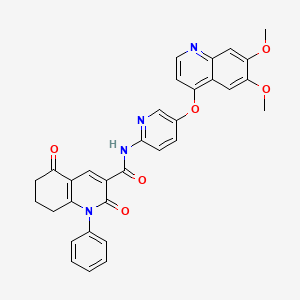m6A-centered Drug Response Information
General Information of the Drug (ID: M6APDG03039)
| Name |
ONO-7475
|
||||
|---|---|---|---|---|---|
| Synonyms |
1646839-59-9; UNII-0VCB95RHRV; N-(5-((6,7-Dimethoxyquinolin-4-yl)oxy)pyridin-2-yl)-2,5-dioxo-1-phenyl-1,2,5,6,7,8-hexahydroquinoline-3-carboxamide; N-[5-[(6,7-Dimethoxy-4-quinolinyl)oxy]-2-pyridinyl]-1,2,5,6,7,8-hexahydro-2,5-dioxo-1-phenyl-3-quinolinecarboxamide; SCHEMBL16426362; ONO7475; BCP33232; MFCD32689448; s8933; ONO-7475; ONO 7475; HY-114358; CS-0083699; 3-Quinolinecarboxamide, N-(5-((6,7-dimethoxy-4-quinolinyl)oxy)-2-pyridinyl)-1,2,5,6,7,8-hexahydro-2,5-dioxo-1-phenyl-; N-[5-(6,7-dimethoxyquinolin-4-yl)oxypyridin-2-yl]-2,5-dioxo-1-phenyl-7,8-dihydro-6H-quinoline-3-carboxamide
Click to Show/Hide
|
||||
| Status |
Phase 1/2
|
||||
| Structure |
 |
||||
| Formula |
C32H26N4O6
|
||||
| InChI |
1S/C32H26N4O6/c1-40-28-16-21-24(17-29(28)41-2)33-14-13-27(21)42-20-11-12-30(34-18-20)35-31(38)23-15-22-25(9-6-10-26(22)37)36(32(23)39)19-7-4-3-5-8-19/h3-5,7-8,11-18H,6,9-10H2,1-2H3,(H,34,35,38)
|
||||
| InChIKey |
WHMMKPWGWNYYFE-UHFFFAOYSA-N
|
||||
| PubChem CID | |||||
| TTD Drug ID | |||||
Target Gene(s) and Their Upstream m6A Regulator, Together with the Effect of Target Gene(s) in Drug Response
The target genes involved in drug-target interaction (such as drug-metabolizing enzymes, drug transporters and therapeutic targets) and drug-mediated cell death signaling (including modulating DNA damage and repair capacity, escaping from drug-induced apoptosis, autophagy, cellular metabolic reprogramming, oncogenic bypass signaling, cell microenvironment, cell stemness, etc.) could be regulated by m6A regulator(s) and affected their corresponding drug response. You can browse detailed information on drug-related target gene(s) mediated by m6A regulators.
Tyrosine-protein kinase Mer (MERTK)
Fat mass and obesity-associated protein (FTO)
| In total 1 mechanisms lead to this potential drug response | ||||
| Response Summary | Tyrosine-protein kinase Mer (MERTK) is a therapeutic target for ONO-7475. The Fat mass and obesity-associated protein (FTO) has potential in affecting the response of ONO-7475 through regulating the expression of Tyrosine-protein kinase Mer (MERTK). | [1], [2] | ||
YTH domain-containing family protein 2 (YTHDF2)
| In total 1 mechanisms lead to this potential drug response | ||||
| Response Summary | Tyrosine-protein kinase Mer (MERTK) is a therapeutic target for ONO-7475. The YTH domain-containing family protein 2 (YTHDF2) has potential in affecting the response of ONO-7475 through regulating the expression of Tyrosine-protein kinase Mer (MERTK). | [1], [2] | ||
Tyrosine-protein kinase UFO (AXL)
Methyltransferase-like 3 (METTL3)
| In total 1 mechanisms lead to this potential drug response | ||||
| Response Summary | Tyrosine-protein kinase UFO (AXL) is a therapeutic target for ONO-7475. The Methyltransferase-like 3 (METTL3) has potential in affecting the response of ONO-7475 through regulating the expression of Tyrosine-protein kinase UFO (AXL). | [3], [4] | ||
RNA demethylase ALKBH5 (ALKBH5)
| In total 1 mechanisms lead to this potential drug response | ||||
| Response Summary | Tyrosine-protein kinase UFO (AXL) is a therapeutic target for ONO-7475. The RNA demethylase ALKBH5 (ALKBH5) has potential in affecting the response of ONO-7475 through regulating the expression of Tyrosine-protein kinase UFO (AXL). | [4], [5] | ||
References